Pale Fire – Vladimir Nabokov

My review of this author’s collected Stories: https://dflewisreviews.wordpress.com/2018/10/06/collected-stories-vladimir-nabokov/
My previous reviews of older or classic books: https://dflewisreviews.wordpress.com/reviews-of-older-books/
When I read this book, covfefe permitting, my thoughts will appear in the comment stream below…
4 thoughts on “Pale Fire – Vladimir Nabokov”
COMMENTARY
.
Up to line 12
Up to line 12
I know my own reviews have loads of cross-references and in the first few pages of his vast ‘pudgy’ commentary, I can already see that this teems with Skinboat’s, sorry, Kinbote’s cross-references — from the lines of Shade’s poem — with his, Kinbote’s, own fictional land of Zembla, which he seemingly talked about with Shade. This is all a bit presumptuous, I feel, especially as his forename is purported to be shared with that of Zembla’s King. And how can anyone trust Kinbote when he misspells the title of FINNEGANS WAKE (an e after the nn and no apostrophe before the s) as “Finnigan’s Wake” !! !! (My previous review, over twelve different websites, of Finnegans Wake: https://dflewisreviews.wordpress.com/2014/02/05/finnegans-wake-james-joyce/ )
“Line 17: And then the gradual; Line 29: gray
By an extraordinary coincidence (inherent perhaps in the contrapuntal nature of Shade’s art) our poet seems to name here (gradual, gray) a man…”
By an extraordinary coincidence (inherent perhaps in the contrapuntal nature of Shade’s art) our poet seems to name here (gradual, gray) a man…”
I find this hilarious. By extraordinary coincidence, too, I have spent years publicly on this Gestalt Real-Time Reviewing site scrying such extraordinary coincidences of literary wordplay, words by instinct or typo or phonetics or semantics or visual graphology, beyond even Wimsatt’s Intentional Fallacy! (I first learnt about the latter literary theory in 1967 from Anne Cluysenaar.) Call it Confirmation-Bias, if you like, but I have found it works well with literature and hyper-imaginative genre fiction. He, old Skinboat claims that Shade here with ‘gray’ and ‘gradual’ refers to (Jacob) Gradus and the story or truth regarding Zembla etc.
…or as if the Pale Fire Cantos are retrocausally affected by this subsequent Commentary and, thus, by Skinboat himself !!….. representing a general conundrum I have publicly grappled with on many occasions.
…or as if the Pale Fire Cantos are retrocausally affected by this subsequent Commentary and, thus, by Skinboat himself !!….. representing a general conundrum I have publicly grappled with on many occasions.
“We shall accompany Gradus in constant thought, as he makes his way from dim distant Zembla to green Appalachia, through the entire length of the poem.”
Lines 47 – 48
“The first name refers to the house in Dulwich Road…”
The rest of Kinbote’s ‘commentary’ on lines 47-48
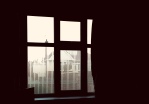 ”Windows, as well known, have been the solace of first-person literature throughout the ages.”
”Windows, as well known, have been the solace of first-person literature throughout the ages.”
Only a few days ago, I posted this photo of my own lockdown window at home, and there stated that I was becoming increasingly persecuted by my own confirmation-biases. Between me and literature’s gestalt. Here, I sense an escape, as, taking on, at least temporarily, Kinbote’s persona, I surveil Shade’s own HOUSE of Leaves amid the environs (including “three conjoined lakes called Omega, Ozero, and Zero”) of Dulwich Rd, knowing that what I am seeing through Shade’s window is him writing the long poem of four cantos, and I watch Sybil his wife persuading him to leave out all the Zembla semblances that I try to instil by gestalt into his mind and, thus, into the poem itself! I can even see him picking his ear with a pencil. And “A tall lamp with parchment-like shade…”
But what of the boy at the end of this section, flying what might be a modern drone in disguise.
But what of the boy at the end of this section, flying what might be a modern drone in disguise.
Line 71: parents
“The Lukins are an old Essex family.”
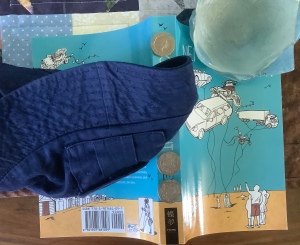 I see Shade’s parents were bird experts, as well as his father being qualified in medicine and, aptly today, surgical instrument manufacture. The bird loving brings me to other flying objects, here expounded upon from the phrase “flying apparatuses”…and remind me, almost too conveniently, of a certain book’s cover I mentioned earlier above … and together with some more old nonsense from Kinbote about his dubious Zembla Mythos and the political or manic monarchic or dynastic matters connected thereto, together with Kinbote’s seeming grievance that, when reading between the lines, he is not given sufficient credit and configuring as a person within the Cantos as well as within a certain academic work about Shade.
I see Shade’s parents were bird experts, as well as his father being qualified in medicine and, aptly today, surgical instrument manufacture. The bird loving brings me to other flying objects, here expounded upon from the phrase “flying apparatuses”…and remind me, almost too conveniently, of a certain book’s cover I mentioned earlier above … and together with some more old nonsense from Kinbote about his dubious Zembla Mythos and the political or manic monarchic or dynastic matters connected thereto, together with Kinbote’s seeming grievance that, when reading between the lines, he is not given sufficient credit and configuring as a person within the Cantos as well as within a certain academic work about Shade.
Line 79: a preterist
There is here more Zemblan nonsense from Kinbote, still reading such things INTO the Shade Cantos by various nefarious means. As if Shade is some form of shadow from our warming Sun as pale fire? But more importantly, Kinbote’s otherwise judicious quoting of the word’ preterist’ evokes my own ‘article’ ‘The Preterite of the Preinternet’ here in 2014.
Line 137: lemniscate
I have known this word for many years.
I even included an example of one on the cover of CONE ZERO: Nemonymous 8 (2008)
I even included an example of one on the cover of CONE ZERO: Nemonymous 8 (2008)

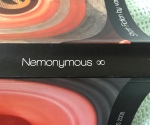
CONTINUED HERE: https://dflewisreviews.wordpress.com/2020/04/06/pale-fire-vladimir-nabokov/ or PALE FIRE (2) on this site.

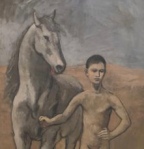 But, having regathered most of my composure, I have now so far read three of these pages. Against my better judgement, I have been captivated by the Kinbote-described décor and family accoutrements of this house that he rented from Judge Goldsworth, in the days when he, Kinbote, entertained Shade and worked at Wordsmith University (unless I mis-recall) (and my own family have called me a ‘wordsmith’ over the years), a houseful of photographs, paintings (including this Picasso, but shown in full length), and books where can be found memorabilia of how, inter alia, Goldsworth dealt with hoodlums etc. One photo shows the Judge with his wife, each with their own gender reversed. A medicine chest, a used safety-blade slit, the cat’s diet list, and logistics for curtains and furniture to avoid sunlight.
But, having regathered most of my composure, I have now so far read three of these pages. Against my better judgement, I have been captivated by the Kinbote-described décor and family accoutrements of this house that he rented from Judge Goldsworth, in the days when he, Kinbote, entertained Shade and worked at Wordsmith University (unless I mis-recall) (and my own family have called me a ‘wordsmith’ over the years), a houseful of photographs, paintings (including this Picasso, but shown in full length), and books where can be found memorabilia of how, inter alia, Goldsworth dealt with hoodlums etc. One photo shows the Judge with his wife, each with their own gender reversed. A medicine chest, a used safety-blade slit, the cat’s diet list, and logistics for curtains and furniture to avoid sunlight. 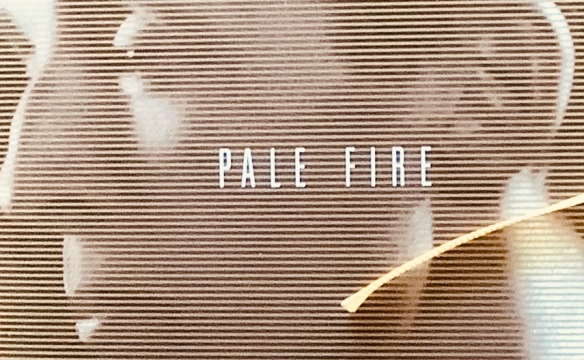
 Up to line 62
Up to line 62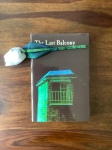
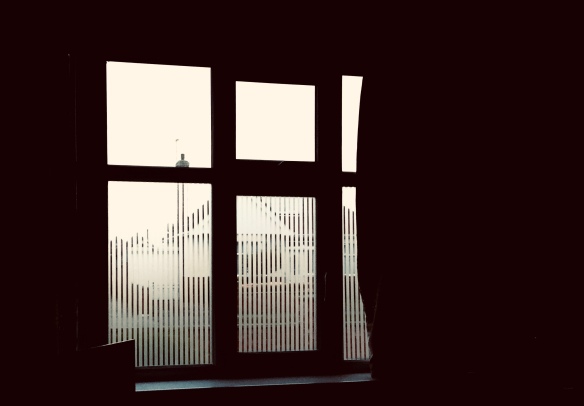
by Charles Kinbote (1959)
“: John Shade perceiving and transforming the world, taking it in and taking it apart, recombining its elements in the very process of storing them up so as to produce at some unspecified date an organic miracle…”
I feel I have been trying to achieve something similar with my gestalt real-time reviewing for the 12 years they have taken so far. A “sudden flourish of magic” and there! – an imaginative work of words suddenly resides as triangulated by the coordinates of us all. Here, Kinbote’s reviewing — of the forthcoming work we are about to read — seems to assume, as mine often generally does, that there is nothing new in literature other than the contribution of each work to the ever-echoing gestalt. A congeries of synchronicities and cross-references. Here, however, the reviewer Kinbote actually knows the author, visits his home, knows his wife, competes with other academics to know him deepest of all, and Kinbote almost loves Shade (loves the inner svelte core of Shade’s otherwise pudgy persona) just in the same way as Kinbote does not seem to love women… I infer many things from this foreword, and was reminded somehow of John Barth and Mark Danielewski. Finding hidden impossible rooms and attics and cellars and sot-weed factors in the forthcoming work (about to be read), a work that already expands beyond the margins of its core into endless pudgy commentary (!), a work threatened by this foreword’s stated “pale fire of the incinerator” and represented by today’s synergy of Climate Change and Covid-19, unless, of course, cancelling each other out rather than synergising?
“: the lost glove is happy.”
I intend to read all four cantos of John Francis Shade before reading what appears to be an extremely ‘pudgy’ series of commentaries by Charles Kinbote on its text, commentaries that follow it in this book.
PALE FIRE: A POEM IN FOUR CANTOS
Canto One
“Finding your China right behind my house”
“…the leaves
Or indoor scene, or trophies of the eaves.”
Indeed some ‘quirk of space’ makes me unable to see its roof, ‘a fold or furrow in the fragile vista’. Yet, whatever the quirk, these lines rhyme in perfect couplets. I am not an expert on verse, but are these lines the sort of lines I once learnt at school as Alexandrines with Caesurae? (It would be appropriate if they were as I am currently reviewing the Alexandria Quartet!) No expert, it is true, but I know what I like, and I like this! It is utterly captivating, complex enough to enjoy tussling with it, simple enough to bathe in its flowing meaning, and I feel I am growing up in this House of Leaves as the poet seems to have done (“Asthmatic, lame and fat” and never swing a bat.) And I think it coins what is now my favourite word: “iridule”. But there is so much else to tell you about…
“I felt distributed through space and time:”
“Yet if prior to life we had
Been able to imagine life, what mad,
Impossible, unutterably weird,
Wonderful nonsense it might have appeared!”
This canto includes a striking account of what seems to be the suicide of Shade’s daughter. I stand by that interpretation, despite the fact that the rules of gestalt real-time reviewing entail that my comments need to try to wholly depend on my first reading of a text and my immediate reaction to it, without later revision or research. Of course, Kinbote talks earlier about Shade’s palimpsests of text and of his own palimpsests of commentary! But as Kinbote himself says earlier in the Foreword, the commentator always has the last word. And, at least at the moment, I am the one who is the commentator, whatever my credentials or diligence!
There is a timely mutual synergy that arises, however — a literary synergy that other readers can check out — from the fact that I am currently reading and reviewing (here) a revelatorily agonising novel based on the suicide of one’s child.
“‘There’s one misprint — not that it matters much: / “Mountain” not “fountain”. The majestic touch.’ // Life Everlasting — based on a misprint!”
As a sort of Dryden’s or Pope’s version of ‘Finnegans Wake’ and Katherine Mansfield (my reviews respectively here and here) and my now what appears in hindsight to be a premature astute reference, at the start of this review, to ‘HOUSE of Leaves’, the latter I say now as if written by Proust, or dare I say (with my having read and reviewed here all his short stories) by Nabokov himself!
Too much to tell you about here, but, fundamentally, this Canto seems to be a puckish exploration, in the above styles, of Shade’s life after death, as if a poet’s vision of being a widower once with two dead wives, now meeting them again, as he meets his dead daughter again, too. I am not sure of the references to ‘incest’ that I recall being made somewhere in this Canto…
Lolita swept from Florida to Maine.”
This, to my inexpert eye, is matchless poetry in rhyming couplets. The acme of the art. But with elements of someone else’s freehold self-ridicule hovering over that leasehold poet?
Using this valuable vehicle, the poet called Shade speculates on the difference between working in the head and working with a paused pen. And shaving his beard in the Barth: “…and now I plough / Old Zembla’s fields where my gray stubble grows, / And slaves make hay between my mouth and nose.” The semblance of the Zembla mentioned in the forgoing foreword? A bath as Kinbote’s skinboat…
And finally he really gets to the follicle roots of what I have long described as my central purpose in garnering some fiction truth from literature by means of gestalt real-time reviewing…
“I feel I understand / Existence, or at least a minute part / Of my existence, only through my art / In terms of combinational delight.”